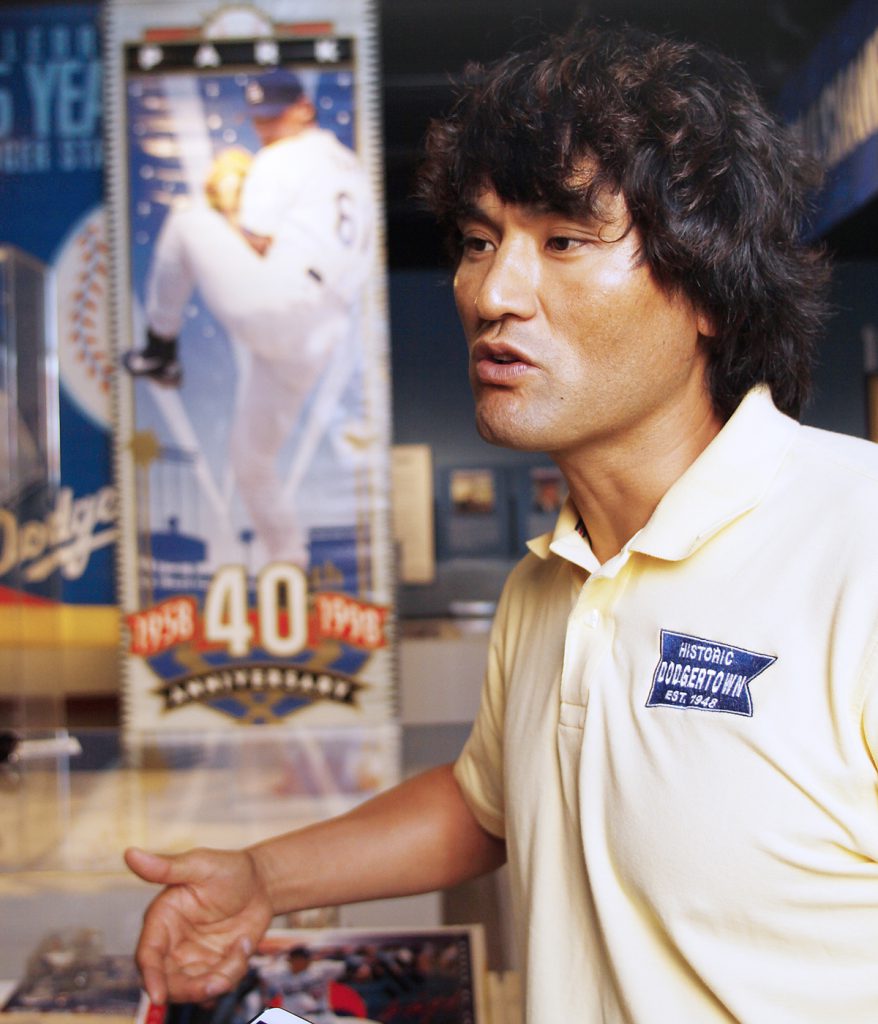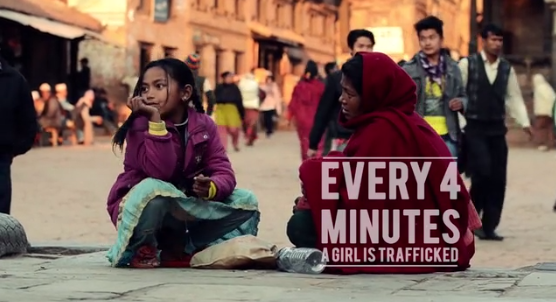story by STEVE HAN
photographs by MARIO GERSHOM REYES / RAFU SHIMPO
As Chan Ho Park strolled into the Japanese American National Museum in Los Angeles’ Little Tokyo, with his wife at his side and holding hands with their two daughters, the museum’s president and CEO Greg Kimura greeted the family and then asked the girls, “I know he’s just a dad to you girls, but you do know that your dad is a legend, right?”
Park, who retired from professional baseball in 2012, paid a visit to the museum on Aug. 27 to view the baseball exhibit, “Dodgers: Brotherhood of the Game,” which explores and celebrates his career, as well as those of other former players (Jackie Robinson, Fernando Valenzuela and Hideo Nomo), manager (Tommy Lasorda) and executives (Branch Rickey, Walter O’Malley and Peter O’Malley), whose accomplishments on the baseball field go beyond statistics and wins. The exhibit recounts their contribution to shaping America’s racial diversity and the civil rights movement with stories, photos and original artifacts.
Peter O’Malley, the former owner of the Dodgers who signed Park and made him Korea’s first ever major leaguer in 1994, accompanied the family.
“I’m just so proud of him,” said O’Malley. “Chan Ho came to the Dodgers when no one at the organization spoke Korean. He didn’t speak much English. But he wasn’t reluctant at all. He wanted to face the best hitters in the major leagues and challenge them.”
After arriving in the major leagues, Park soon became one of the best pitchers for the Dodgers. He went on to win at least 13 games for five straight seasons between 1997 and 2001. His success in the major leagues opened something of a floodgate for South Korean ballplayers from Byung-Hyun Kim to Hee-Seop Choi to today’s Hyun-Jin Ryu and Shin-Soo Choo, both of whom landed multi-million dollar contracts with their respective ball clubs.
“We knew Chan Ho would be a pioneer,” O’Malley said. “We clearly knew that others would follow. More than anything, I wanted the Dodger team to reflect the community here in Los Angeles. Having Fernando [Valenzuela] was important for the community from Mexico. Having Chan Ho for the Korean American community, Hideo [Nomo] for the Japanese American community. I wanted our players to reflect what Los Angeles was all about. And they all did. They all did it very well.”
After touring the exhibit, Park spoke to KoreAm about his years in the major leagues, his impact on the Korean community and “returning the favor” to the kids from South Korea who recently won the Little League World Series.
 Chan Ho Park, his two daughters and JANM president and CEO Greg Kimura
Chan Ho Park, his two daughters and JANM president and CEO Greg Kimura
This exhibit celebrates the contribution of former Dodgers who contributed to America’s civil rights movement. In your perspective, what is it about your career that puts you on the same list as the likes of Jackie Robinson?
Throughout my 17 years in the major leagues, I’ve experienced both happiness and difficulties. But now that I look back, I feel like I tend to remember the tough times more vividly. At that moment, when things were really tough, I was desperate to forget those moments, but now that everything is said and done, I’m thankful for all the challenges I faced. For me, overcoming those obstacles allowed me to become who I am today. That’s why the fans appreciate me, and it’s what allows me to have the kind of relationship I have with them. If I can pick one thing that I’ve done really well in my playing career, it’s the fact that I never quit.
How does it feel to visit this exhibit to see your career being celebrated alongside some of these all-time greats?
I’m really grateful. When I began playing, I never imagined that I’d accomplish any of this. But now I understand that for people who appreciate baseball, coming to an exhibit like this is a way of celebrating history and reconnecting with moments when baseball left a positive impact on their lives. I’m so thankful that I played even a small role in making that happen. Now, the one thing that I do want to see is the Korean American community in particular being more proactive with hosting a similar event, so that the younger generation within our own community can have easier access to learning the messages that baseball conveys.
Why do you say that it’s important for the Korean American community to host these events?
There was a similar exhibit in Korea last year. It was about how baseball, my career in the major leagues in particular, played a role in giving the Korean people hope amid the Asian financial crisis in the late 1990s. It wasn’t about celebrating winning or losing. It was about how baseball gave hope to people who were struggling at that particular time. At that exhibit in Korea, I was able to see firsthand how young people, many of whom weren’t even born or necessarily remember those times, were taught valuable lessons. I can no longer pitch on the mound. I’m too old! So I’m always so thankful when I see an exhibit like this that could help young people remember what I did, or what baseball did in the past. I just hope to see more of these in Koreatown now.
Speaking of young people, 11 to 13-year-old South Korean kids won the Little League World Series recently.
I had a chance to meet them during the tournament. It was surreal how kids are so different compared to my generation. Obviously, I’ve watched Hyun-Jin [Ryu, the current Dodger and Park’s former teammate at the Hanwha Eagles and the Korean national team] pitch for the Dodgers and felt the same way. But after seeing our kids at the Little League World Series, I really feel like the younger generation changed a lot compared to us.
How exactly are kids today different?
You have to understand that these kids grow up watching the likes of Hyun-Jin and Shin-Soo [Choo of the Texas Rangers]. They grow up watching the major leagues and realize that it’s a realistic goal for them to play there themselves one day. When I was growing up, playing in the major leagues wasn’t even in my imagination! When Korea last won the Little League World Series in 1985, the kids then had no idea that playing in the major leagues was even possible. But for these kids now, they grow up in an environment where they can set the highest goals and they know that they can achieve their dreams. So it’s up to the adults now to help our kids realize those dreams. The Korean people these days are living in sadness because of all the things that have happened recently, and I’m just so proud that these young players have done something that our people could be proud of. The adults should return the favor now.
 Chan Ho Park, with one of his daughters, shares a moment with Peter O’Malley.
Chan Ho Park, with one of his daughters, shares a moment with Peter O’Malley.
What do you mean when you say that it’s now up to the adults?
I’m saying that we can’t just take the value of their win for granted. Now that they’ve come home after winning the World Series, people could easily just say, “Good job!” and move on. These kids have done something really special to make us happy when we felt like we’ve been down. So it’s up to us to create the kind of infrastructure for them so that as they grow, they continue to develop in an environment that helps them achieve their dreams. When we send our kids overseas for international tournaments, we shouldn’t just cheer for them and expect them to win and think that’s all we can do. It’s our responsibility to create meticulous plans to help them grow further and prosper.
So hopefully, we get to see more Hyun-Jin Ryus and Shin-Soo Choos in the future.
To me, Hyun-Jin is not just a successor of mine. He’s my child. I love him so much. But technically, I see him pitch in games in the major leagues and realize that he’s so much better than I was. He plays a higher quality baseball. I see him pitch and always tell myself, “Wow, Korean baseball has come so far.” Like I said, when Hyun-Jin first started watching the major leagues as a kid, that’s when I was pitching for the Dodgers. Today, the core group of professional baseball players in Korea grew up watching the major leagues. Kids who grow up watching baseball of the highest quality are different. And I’m just happy that I played a role in creating that kind of environment.
The “Dodgers: Brotherhood of the Game” exhibit began last March and will continue through Sept. 14 at JANM. For more information, visit http://www.janm.org/exhibits/dodgers/





